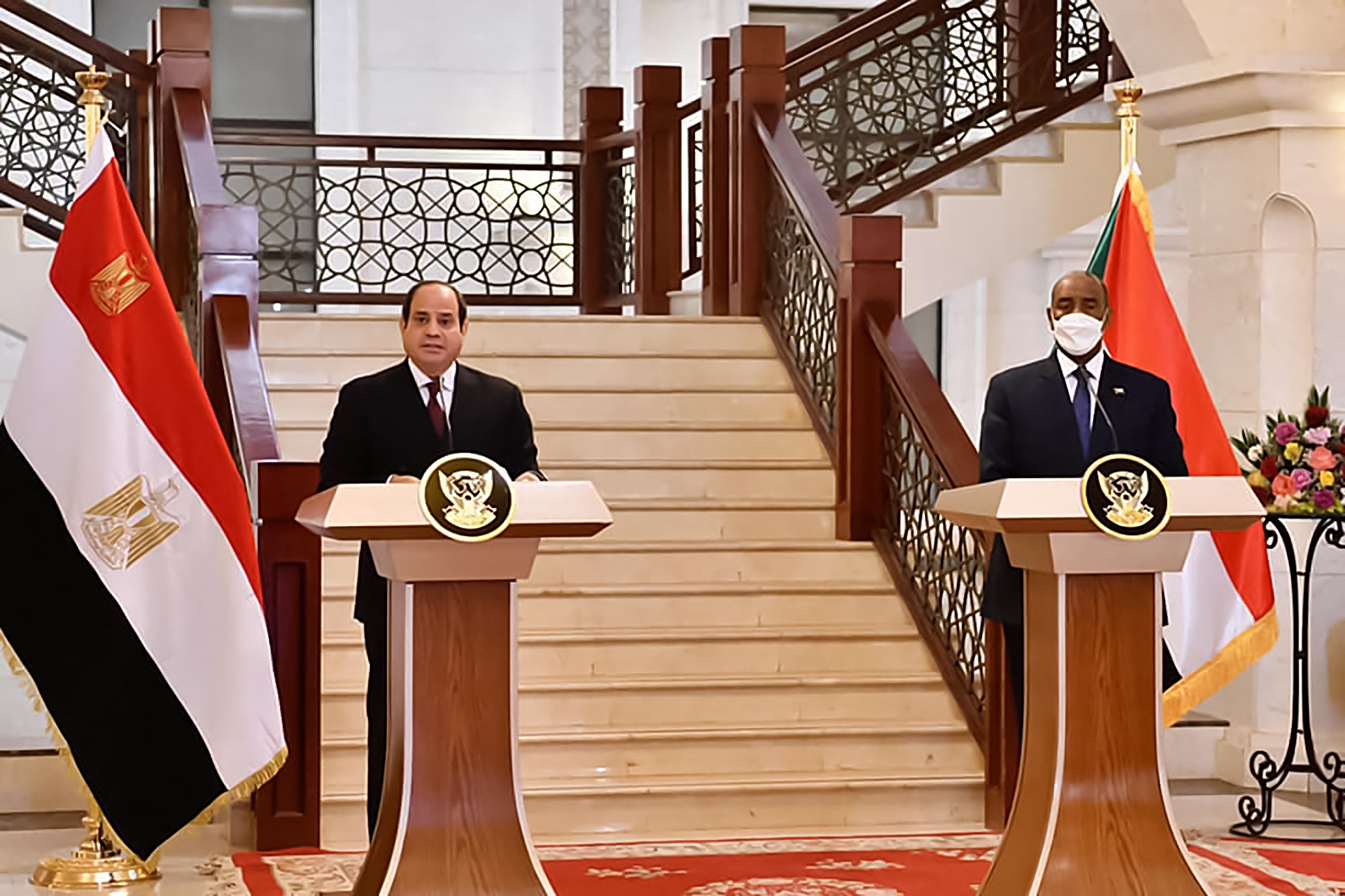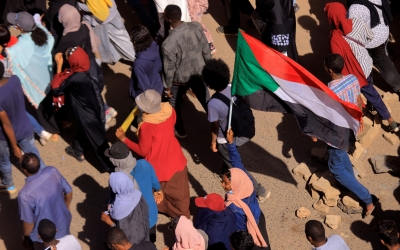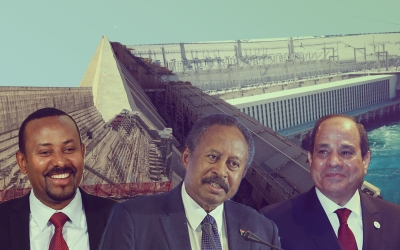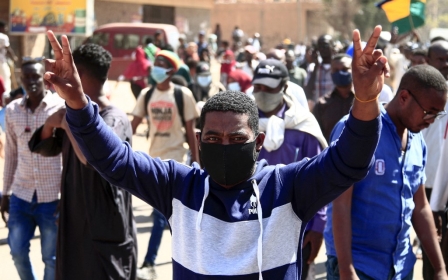Sudanese protesters accuse Cairo of supporting coup, straining relations

Historically strong ties between Sudanese and Egyptians are being severely tested as pro-democracy protesters continue to accuse Cairo of supporting Sudan's military coup and scheming to introduce an Egyptian model of rule.
The closure of the roads between the two countries began earlier this month when residents and farmers in Sudan's Northern state staged a sit-in and closed roads in protest against rising tariffs and energy prices.
The move has left hundreds of Egyptian trucks carrying food and non-food items stranded in the area.
Intensified through social media and political speeches, those tensions have now taken on a populist and racial tone, with protesters urging Egypt to stop what they describe as its interference in Sudanese domestic issues, and calling on Sudan's military leaders to stop serving Egyptian interests and listen to their own demands.
Hamza Mohamed Tahir, a leading member of the resistance committees in Northern state, told MEE that while the road closures had begun as a reaction by the local farmers to the lifting of electricity subsidies and an increase in tariffs, it had quickly escalated to protests against the killing of protesters in Khartoum and finally become a clear, popular movement against what many Sudanese believed to be Egyptian support of the military.
Tahir said a new movement of which he was a part, called the “Northern barricades”, had blocked the Northern and River Nile states in different locations to cut the roads linking Sudan with Egypt and Port Sudan on the Red Sea coast.
“We put our barricades and closed the roads on the two banks of the Nile in the areas of Hafir Masho, Dalgo and Albrgig in northern Sudan among other areas in the River Nile State,” he told MEE over the phone.
Tahir confirmed that hundreds of trucks carrying Sudanese commodities were stranded on the roads.
“Egypt is allying with the military coup in Sudan. I think our voice will now be heard in Cairo,” he said.
Democracy 'scary for Egypt'
Sudanese anger against Egypt over developments in the country's politics is not a new phenomenon.
Following the April 1985 uprising in Sudan that removed the former President Jaafar Nimeiri, thousands of Sudanese vented their anger against Egypt, burning down its flag in front of its embassy in Khartoum and calling on Cairo to handover Nimeiri who had fled to the Egyptian capital.
After the overthrow of Sudan's President Omar al-Bashir in April 2019, several members of Bashir's administration made their way to Egypt.
Former spy chief Salah Gosh, ex-minister of defence Awad Ibn Auf, the former army chief of staff Kamal Abdul Maarouf as well as senior army officers, including the ex-chief of staff Emad Adawi and former interior minister Esmat Abdul Rahman, are all now reportedly based in Cairo.
Abdul Salam Ahmed, a 56-year-old engineer who participated in the 1985 protests, told MEE the demonstrators believed Nimeiri had been involved in corruption and committed many crimes so should be prosecuted in Sudan.
“It’s similar to what is happening now," said Ahmed. "Egypt doesn’t like to see democracy in Sudan.
"The dangers of extending democracy are even more scary for Egypt than radical Islamic ideas.”
Esam Shaban, an Egyptian scholar in African affairs, told MEE that Egypt has interests in Sudan and closely monitors what is going on there, anticipating its possible reflection in Egypt.
Economic sovereignty
Trade between Egypt and Sudan has been growing in recent years, amounting to $718m from January 2021 to June 2021, compared with $291.8m during the same period in 2020.
Total Egyptian exports to Sudan were recorded at $419m from January 2021 to June 2021, compared with $172.3m during the same period in 2020; while Sudanese exports to Egypt amounted to $299m from January 2021 to June 2021 compared with $119.5m during the same period in 2020.
Sudanese exports to Egypt include raw materials, livestock, sesame, cotton, peanuts, and other agricultural and animal products, while Egypt exports a wide range of commodities to Sudan, including foodstuffs, industrial products, chemicals, machinery and equipment.
Sarah Hamed, a Sudanese doctoral candidate at Uppsala University in Sweden, says the blockade is both a cry against the neoliberal polices adopted by the coup government and a reflection of Sudanese demands for economic sovereignty.
“Farmers who initiated the blockade as a protest against the rising prices of electricity due to the harsh neoliberal policies implemented by the coup government, quickly developed their demands to include issues related to ownership of resources generated in the northern area of Sudan, such as resources from the mines, as well as demands against the export of raw materials to Egypt,” the sociologist told MEE.
“These demands reflect an in-depth understanding of the extractive and exploitative nature of the Sudanese economy, which relies on the export of raw materials to foreign countries without yielding any benefits to the people involved in extracting these resources.
“The blockade also highlights the issue of sovereignty which Sudan has lost since the Turkish-Egyptian colonisation, followed by the British-Egyptian colonisation and the ongoing neo-colonialism marked by vicious competition over Sudanese resources from both regional countries, including Egypt and international western countries, backed by a military and elitist complex who benefit from this.”
'Racialised discourse'
Hamed said that the current movement against Egypt was both a reaction to Cairo's interference in Sudanese politics as well as a racialised discourse in Egypt against Sudan.
“The blockade hence marks a disruption both to the national Sudanese bourgeoisie discourse - by bringing the economic issue and the issue of national sovereignty to the forefront - as well as a disruption to the racialised discourse that has characterised to a large extent the way Egypt deals with Sudan; those two issues are of course interwoven.”
Ramy Yahia, an Egyptian researcher in Sudanese-Egyptian relations, agreed that public anger in Sudan is a result of both historical and current mistakes but argued, "We have to differentiate between the state and the people in Egypt.
"The Egyptians are oppressed by military rulers like the Sudanese, so when you use this tool of blocking the exports that means the Egyptians are being punished twice,” he told MEE.
Tahir stressed that the ongoing blockade of the roads was not intending to punish ordinary Egyptians, and that he was keen to keep good relations between Sudanese and Egyptians.
Lack of revolutionary focus
Egyptian researcher Easm Shaban warned that the closure of the roads on the border was based on false perceptions and would negatively impact relations between the Sudanese and Egyptians, and not necessarily affect the official Egyptian stance towards what is going on in Sudan.
“Historically, disputes between the two countries have been misused by politicians on both sides, and also exploited by some regional and international powers to sabotage relationships based on historical geopolitics and mutual interests,” he said.
Shaban said he believed regional issues were also behind the tensions, especially regarding Egyptian interests over the Grand Ethiopian Renaissance Dam and the entire issue of the sharing of Nile water.
“Egypt is also keen to prioritise the issue of Nile water, as Cairo always intended to place Sudan on its side over this issue,” he told MEE.
Shaban also said he believed the current disputes based on identity and culture may divert the public and revolutionaries in Sudan from what should be their goals.
“The Sudanese revolution needs to fight for the social aspect... and defend the poor classes rather than being preoccupied by identity and cultural questions that will distract the revolution in Sudan, similar to other revolutions in the region," he said.
"So the oppressed people in the region need to unify themselves rather than run after populist issues.”
Middle East Eye delivers independent and unrivalled coverage and analysis of the Middle East, North Africa and beyond. To learn more about republishing this content and the associated fees, please fill out this form. More about MEE can be found here.







